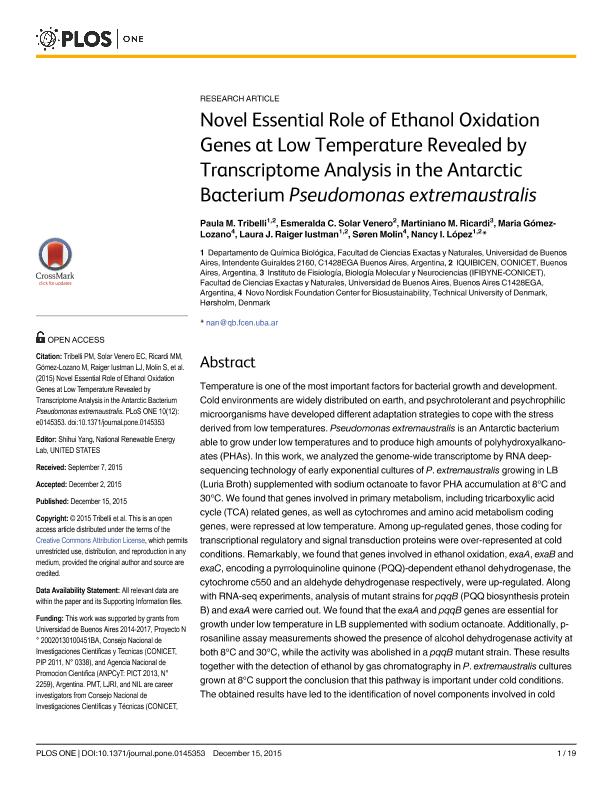Artículo
Novel essential role of ethanol oxidation genes at low temperature revealed by transcriptome analysis in the antarctic bacterium pseudomonas extremaustralis
Tribelli, Paula Maria ; Solar Venero, Esmeralda Clara
; Solar Venero, Esmeralda Clara ; Ricardi, Martiniano María
; Ricardi, Martiniano María ; Gómez Lozano, Maria; Raiger Iustman, Laura Judith
; Gómez Lozano, Maria; Raiger Iustman, Laura Judith ; Molin, Søren; López, Nancy Irene
; Molin, Søren; López, Nancy Irene
 ; Solar Venero, Esmeralda Clara
; Solar Venero, Esmeralda Clara ; Ricardi, Martiniano María
; Ricardi, Martiniano María ; Gómez Lozano, Maria; Raiger Iustman, Laura Judith
; Gómez Lozano, Maria; Raiger Iustman, Laura Judith ; Molin, Søren; López, Nancy Irene
; Molin, Søren; López, Nancy Irene
Fecha de publicación:
12/2015
Editorial:
Public Library of Science
Revista:
Plos One
ISSN:
1932-6203
Idioma:
Inglés
Tipo de recurso:
Artículo publicado
Clasificación temática:
Resumen
Temperature is one of the most important factors for bacterial growth and development. Cold environments are widely distributed on earth, and psychrotolerant and psychrophilic microorganisms have developed different adaptation strategies to cope with the stress derived from low temperatures. Pseudomonas extremaustralis is an Antarctic bacterium able to grow under low temperatures and to produce high amounts of polyhydroxyalkanoates (PHAs). In this work, we analyzed the genome-wide transcriptome by RNA deepsequencing technology of early exponential cultures of P. extremaustralis growing in LB (Luria Broth) supplemented with sodium octanoate to favor PHA accumulation at 8°C and 30°C. We found that genes involved in primary metabolism, including tricarboxylic acid cycle (TCA) related genes, as well as cytochromes and amino acid metabolism coding genes, were repressed at low temperature. Among up-regulated genes, those coding for transcriptional regulatory and signal transduction proteins were over-represented at cold conditions. Remarkably, we found that genes involved in ethanol oxidation, exaA, exaB and exaC, encoding a pyrroloquinoline quinone (PQQ)-dependent ethanol dehydrogenase, the cytochrome c550 and an aldehyde dehydrogenase respectively, were up-regulated. Along with RNA-seq experiments, analysis of mutant strains for pqqB (PQQ biosynthesis protein B) and exaA were carried out. We found that the exaA and pqqB genes are essential for growth under low temperature in LB supplemented with sodium octanoate. Additionally, prosaniline assay measurements showed the presence of alcohol dehydrogenase activity at both 8°C and 30°C, while the activity was abolished in a pqqB mutant strain. These results together with the detection of ethanol by gas chromatography in P. extremaustralis cultures grown at 8°C support the conclusion that this pathway is important under cold conditions. The obtained results have led to the identification of novel components involved in cold adaptation mechanisms in this bacterium, suggesting for the first time a role of the ethanol oxidation pathway for bacterial growth at low temperatures.
Palabras clave:
Cold
,
Ethanol
,
Essencial
,
Pseudomonas Extremaustralis
Archivos asociados
Licencia
Identificadores
Colecciones
Articulos(IFIBYNE)
Articulos de INST.DE FISIOL., BIOL.MOLECULAR Y NEUROCIENCIAS
Articulos de INST.DE FISIOL., BIOL.MOLECULAR Y NEUROCIENCIAS
Articulos(IQUIBICEN)
Articulos de INSTITUTO DE QUIMICA BIOLOGICA DE LA FACULTAD DE CS. EXACTAS Y NATURALES
Articulos de INSTITUTO DE QUIMICA BIOLOGICA DE LA FACULTAD DE CS. EXACTAS Y NATURALES
Citación
Tribelli, Paula Maria; Solar Venero, Esmeralda Clara; Ricardi, Martiniano María; Gómez Lozano, Maria; Raiger Iustman, Laura Judith; et al.; Novel essential role of ethanol oxidation genes at low temperature revealed by transcriptome analysis in the antarctic bacterium pseudomonas extremaustralis; Public Library of Science; Plos One; 10; 12; 12-2015; 1-19; e0145353
Compartir
Altmétricas



